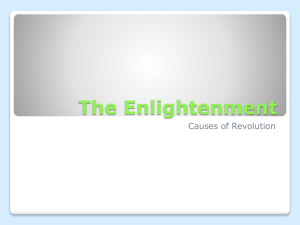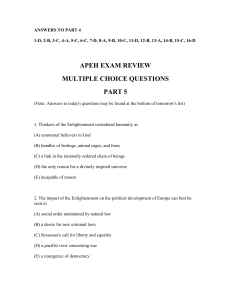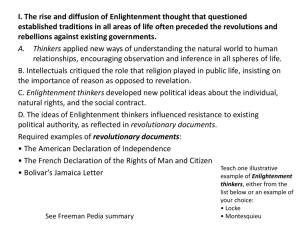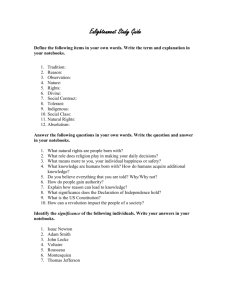Enlightenment: Age of Reason
advertisement
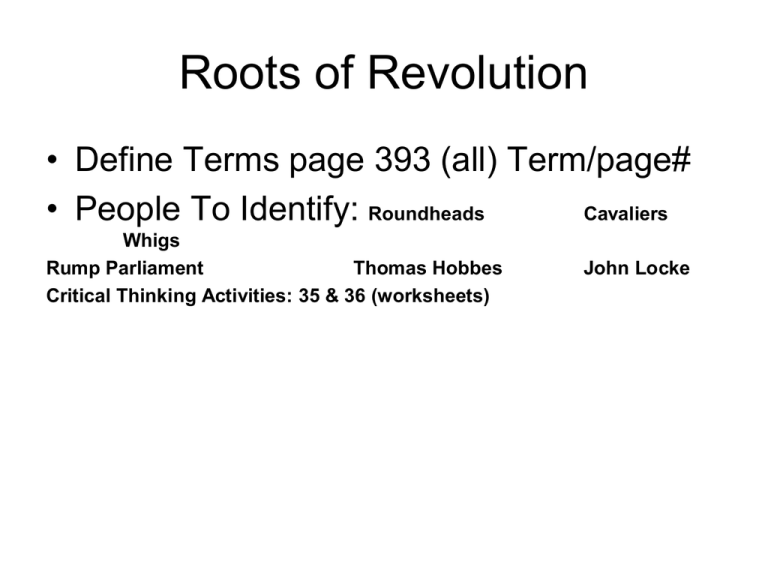
Roots of Revolution • Define Terms page 393 (all) Term/page# • People To Identify: Roundheads Cavaliers Whigs Rump Parliament Thomas Hobbes Critical Thinking Activities: 35 & 36 (worksheets) John Locke Enlightenment Thinkers SWBAT: List at least 3 Enlightenment Thinkers and describe their ideas. The Enlightenment Timeline • 1690-John Locke publishes the Essay Concerning Human Understanding and the Second Treatise of Government. • 1748- Montesquieu publishes The Spirit of the Laws. • 1751-Twenty-eight volumes of Encyclopedia are published. • 1759- Voltaire publishes Candide. • 1762-Rousseau publishes Emile & The Social Contract. • 1764- Cesare Beccaria publishes the Essay on Crimes & Punishments. • 1776 Adam Smith publishes The Wealth of Nations. • 1795- Condorcet’s Progress of the Human Mind is published. Enlightenment Philosophes • John Locke-(1632-1704) Knowledge from Experience. Natural Rights • Voltaire- (1694-1778) Enlightened Despotism, ruler promotes reform. i.e. Russia. • Rousseau (1712-1778)- The Social Contract, Natural education we enter into a General Will. • Montesquieu (1689-1755)-No ideal political system. Separation of Powers The Spirit of the Laws (American & French constitutions). • Adam Smith (1723-1790)- Wealth of Nations: Economic selfinterest. Attacked mercantilism. Enlightenment: Age of Reason •Scientific Revolution-The human mind can understand the secrets of the physical universe. •Scientific Revolution used intellectual powers to discover natural laws. •Thinkers of the enlightenment sought through reasoning to discover the natural laws that governed the affairs of human beings & human society. •They criticized the existence of absolute monarchy & the established church and proposed a reforms designed to eliminate abuses & promote individual freedom. •The Enlightenment thinkers are known collectively as the philosphes. •They were more known as critics of the Olde Regime & developed new ideas about government, economics, and religion and worked to improve human conditions to reform society. •Deism. John Locke • Most famous works are the Two Treatises on Government. • Rulers / governments have an obligation, a responsibility, to protect the natural rights of the people it governs. • If a government fails in its obligation to protect natural rights, the people have the right to overthrow that government. • The best government is one which is accepted by all of the people and which has limited power (Locke liked the English monarchy where laws limited the power of the king). JEAN-JACQUES ROUSSEAU • People are basically good but become corrupted by society (like the absolute monarchy in France). • For Rousseau, the social contract was the path to freedom: people should do what is best for their community. • The general will (of the people) should direct the state toward the common good. Hence, the good of the community is more important than individual interests. MONTESQUIEU • He strongly criticized absolute monarchy and was a voice for democracy. • Separation of Powers - the best way to protect liberty was to divide the powers of government into three branches: legislative; executive; and judicial. • Checks and Balances – each branch of government should check (limit) the power of the other two branches. Thus, power would be balanced (even) and no one branch would be too powerful. • Montesquieu studied the history of governments and cultures all over the world. VOLTAIRE • Advocated freedom of thought, speech, politics, and religion. • Fought against intolerance, injustice, inequality, ignorance, and superstition. • Attacked idle aristocrats, corrupt government officials, religious prejudice, and the slave trade. • He often had to express his views indirectly through fictional characters because he lived in an absolute monarchy in France. DENIS DIDEROT • This philosophe worked 25 years to produce (edit) a 28 volume Encyclopedia – the first one. • The Encyclopedia was not just a collection of articles on human knowledge, it was intended to change the way people thought. Montesquieu, Voltaire, and others wrote articles. • About 20,000 copies were printed between 1751 and 1789 despite efforts to ban the Encyclopedia. MARY WOLLSTONECRAFT • She argued that women had not been included in the Enlightenment slogan “free and equal.” Women had been excluded from the social contract. • Her arguments were often met with scorn, even from some ‘enlightened’ men. • Wollstonecraft and Catherine Macaulay were British feminists. The most famous French feminist was Germaine de Stael. ADAM SMITH • Smith was a Scottish economist who has been called the “father of capitalism.” • He was an advocate of laissez faire (French for ‘let do,’ ‘let go,’ ‘let pass.’ – often referred to as ‘hands off.’). • Laissez faire was a theory of the ‘natural’ laws of economics: business should operate with little or no government interference. Enlightenment Extension: With excerpts from songs listed create a list of the song title and underneath each song list the philosophes, their ideas represented and any lyrics that show as an example of their ideas. 1. 2. 3. 4. Aretha Franklin-Respect Beatles-The Revolution John Lennon- Imagine Pink Floyd- Money Quotes-Who said? In the state of nature profit is the measure of right. Thomas Hobbes!!! Quotes-Who said? Man is born free, and everywhere he is in chains. JEAN-JACQUES ROUSSEAU Quotes-Who said? If women be educated for dependence; that is, to act according to the will of another fallible being, and submit, right or wrong, to power, where are we to stop? • Mary Wollstonecraft Quotes-Who said? We are born with rights because they are a part of nature, of our very existence – they come from god. John Locke!!!!! Quotes-Who said? To love to read is to exchange hours of ennui for hours of delight. I have never known any distress that an hour's reading did not relieve. MONTESQUIEU Quotes-Who said? I do not agree with a word you say but I will defend to the death your right to say it. Voltaire Quotes-Who said? Man will never be free until the last king is strangled with the entrails of the last priest. DENIS DIDEROT
